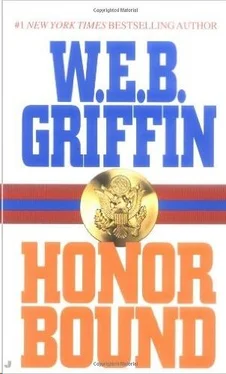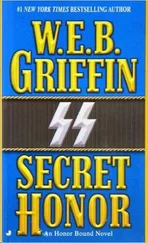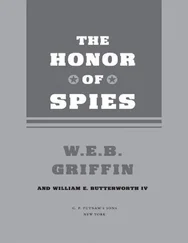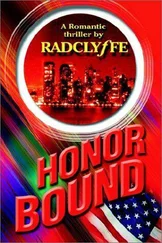Griffin W.E.B. - Honor Bound 01 - Honor Bound
Здесь есть возможность читать онлайн «Griffin W.E.B. - Honor Bound 01 - Honor Bound» весь текст электронной книги совершенно бесплатно (целиком полную версию без сокращений). В некоторых случаях можно слушать аудио, скачать через торрент в формате fb2 и присутствует краткое содержание. Год выпуска: 1993, Жанр: Старинная литература, на английском языке. Описание произведения, (предисловие) а так же отзывы посетителей доступны на портале библиотеки ЛибКат.
- Название:Honor Bound 01 - Honor Bound
- Автор:
- Жанр:
- Год:1993
- ISBN:нет данных
- Рейтинг книги:5 / 5. Голосов: 1
-
Избранное:Добавить в избранное
- Отзывы:
-
Ваша оценка:
- 100
- 1
- 2
- 3
- 4
- 5
Honor Bound 01 - Honor Bound: краткое содержание, описание и аннотация
Предлагаем к чтению аннотацию, описание, краткое содержание или предисловие (зависит от того, что написал сам автор книги «Honor Bound 01 - Honor Bound»). Если вы не нашли необходимую информацию о книге — напишите в комментариях, мы постараемся отыскать её.
Honor Bound 01 - Honor Bound — читать онлайн бесплатно полную книгу (весь текст) целиком
Ниже представлен текст книги, разбитый по страницам. Система сохранения места последней прочитанной страницы, позволяет с удобством читать онлайн бесплатно книгу «Honor Bound 01 - Honor Bound», без необходимости каждый раз заново искать на чём Вы остановились. Поставьте закладку, и сможете в любой момент перейти на страницу, на которой закончили чтение.
Интервал:
Закладка:
The shit-kicker probably asked him a question or something.
When Ettinger saw him, he smiled and waved, and Tony walked up to him.
"What do you say, Ettinger?" Tony said.
"Nice trip, Tony?"
"It was all right."
Tony saw the cowboy looking at his bare ankles.
Fuck you, Tex! Anybody wearing beat-up boots like yours is in no position to say anything about anybody else.
"Tony, this is... Mr. Frade," Ettinger said.
Mr. Frade? This cowboy is Lieutenant Frade? A Marine officer?
"Good morning, Sir," Lieutenant Pelosi said.
" 'Morning," Clete replied. "Pelosi, from here on in, you can belay the 'Sir' business."
"Excuse me?"
"We're supposed to be civilians. Civilians don't say 'Sir.' I'm Clete. He's David. What's your first name?"
"Anthony, Sir," Tony said. Then, "Sorry."
"That all your luggage, Anthony?"
"Yes, S Yeah."
"We're parked out in front," Clete said, then laughed. "What did you do, Anthony, forget your socks?"
"My shoes are too small."
"Well, then, we better stop on the way to the hotel and find you some that fit," Clete said. "Our mentors, who got here at seven this morning, are already convinced that David and I are retarded; if you showed up in bare feet, that would be too much for them."
Ettinger laughed.
Tony Pelosi had no idea what a "mentor" was, but he was goddamned if he was going to ask.
[THREE]
The Franco-Spanish Border
1525 3 November 1942
Train Number 1218 of the Soci?t? Nationale des Chemins de Fer Francais (Paris-Barcelona-Madrid) would be late crossing the border, but there was nothing the officials of the French National Railroad could do about it. It had been requested of them by the representative of the German Rail Coordination Bureau: (a) that a goods wagon then sitting in Paris (number furnished herewith), a Grande Compagnie Internationale des Wagons-Lits sleeping car with crew, and a first-class passenger car be attached to Number 1218; and (b) that Number 1218's schedule be "adjusted" to permit a fifteen- to thirty-minute ceremony at the Spanish border; and (c) that officials of the Spanish National Railroad be informed of the change of schedule.
At 1455, fifteen minutes before Number 1218 was due, the gate (an arrangement of timbers and barbed wire) across the tracks on the Spanish side of the border was moved aside by Spanish Border Police. A moment later a tiny yard engine pushed a passenger car of the Spanish National Railroad across what everybody called "No-Man's-Land" to the similar gate across the tracks on the French side of the border.
After a minute's conversation between French and Spanish officials, the French gate was opened and the yard engine pushed the Spanish passenger car approximately 300 meters farther into the Border Station, where it stopped. About forty rifle-armed members of the Guardia Nacional, all wearing their distinctive stiff black leather hats, debarked from the passenger car and formed two ranks on the platform. A moment after that, two officers of the Guardia Nacional came down from the passenger car, together with four more enlisted men, two of whom carried flags on poles.
One of the flags was that of Spain. The other was unusual. But it was finally identified by one of the French customs officials as the flag of Argentina. The men carrying the flags arranged themselves before the members of the Guardia Nacional, and the two Guardia Nacional enlisted men who had gotten off the train last took up places beside them.
At 1505, five minutes early, Number 1218 moved into the station, on a track parallel to the one where the Spanish National Railways car had stopped. The members of a small Luftwaffe band, equipped primarily with trumpets and drums, descended from the passenger car and formed up quickly under the direction of their bandmaster. They were followed by a mixed detachment of Luftwaffe, Waffen-SS, and Wehrmacht troops, three of each under the command of a Luftwaffe captain. They formed up and were marched back to the goods wagon, from which four of their number removed two sawhorses.
They set up the sawhorses on the platform between the Guardia Nacional and the band. The sawhorses were then covered with a pleated black material which concealed them. They then returned to the goods wagon, from which they removed a very heavy casket, across which the flag of Argentina was draped diagonally.
The flag had three broad stripes running horizontally, first light blue, then white, then again light blue. In the center of the white central stripe was the face of maybe the sun-god. It was golden and smiling. Radiating from it were red streaks, which were probably intended to represent sunbeams.
In the opinion of most of the French Railway officials, it was not a very civilized flag. Perhaps the sort of thing one might expect of some far-off former colony which now imagined itself to be a nation, but not civilized. Provincial people like that never knew when to stop; they could be counted on, so to speak, to try to gild the lily.
The casket-carrying detachment arranged themselves around the casket, four men to a side, one man at the head. The Luftwaffe captain placed himself at the foot of the casket, ordered "Vor-warts!" and somewhat awkwardly (it was extraordinarily heavy), the casket was carried down the platform and installed on the sawhorses.
As soon as this was accomplished, officers and enlisted personnel of the Wehrmacht, the Luftwaffe, and the Waffen-SS began to debark from the passenger and Wagons-Lits carsenlisted and officers from the former, and from the latter officers only, including a Luftwaffe Oberst, an Oberstleutnant from the Wehrmacht, a Waffen-SS Obersturmbannfuhrer (the Waffen-SS equivalent of an Oberstleutnant, or lieutenant colonel), a Luftwaffe Hauptmann, and then a tall, thin, olive-skinned man wearing a uniform no one could recall ever seeing before.
It was decided that he must have something to do with the casket covered with the smiling sun-god flag, and that he therefore must be an Argentinean. It was also noticed that the Luftwaffe Hauptmann in his dress uniform had the Knight's Cross of the Iron Cross hanging around his neck. One didn't see too many of those.
The officers and men who had debarked from the passenger car formed a double rank facing the Guardia Nacional. Two photographers in Wehrmacht uniforms, one still and one motion picture, and a Wehrmacht lieutenant armed with a clipboard now appeared.
At this point, two more uniformed officers descended from the Spanish National Railways car that had been pushed backward into the border station. One was a coronel, the other a teniente. They were photographed and filmed as they walked across the platform and exchanged military salutes and then handshakes with the German officers and with the one who was probably an Argentinean.
All the officers then formed in a line, facing the flag-covered casket. The Luftwaffe colonel looked at the officer commanding the mixed detachment of German Armed Forces personnel. He in turn looked at the bandmaster, who raised his drum major's baton.
"Achtung!" the officer commanding the mixed detachment barked, and everybody came to attention, including the members of the Guardia Nacional.
The bandleader moved his drum major's baton downward in a violent motion. The strains of "Deutschland, Deutschland, Uber Alles" erupted from the band. The officers in the rank, except the Wehrmacht Oberstleutnant and the Luftwaffe captain with the Knight's Cross of the Iron Cross, extended their arms in the locked-elbow, fingers-together, flat salute of the Third Reich. The Oberstleutnant and the Hauptmann rendered the old-fashioned hand salute.
The German national anthem was followed by those of Spain and Argentina. And most of the French Railway officials agreed that the Argentinean anthem, like the sun-god flag, was a bit overdone.
Читать дальшеИнтервал:
Закладка:
Похожие книги на «Honor Bound 01 - Honor Bound»
Представляем Вашему вниманию похожие книги на «Honor Bound 01 - Honor Bound» списком для выбора. Мы отобрали схожую по названию и смыслу литературу в надежде предоставить читателям больше вариантов отыскать новые, интересные, ещё непрочитанные произведения.
Обсуждение, отзывы о книге «Honor Bound 01 - Honor Bound» и просто собственные мнения читателей. Оставьте ваши комментарии, напишите, что Вы думаете о произведении, его смысле или главных героях. Укажите что конкретно понравилось, а что нет, и почему Вы так считаете.












